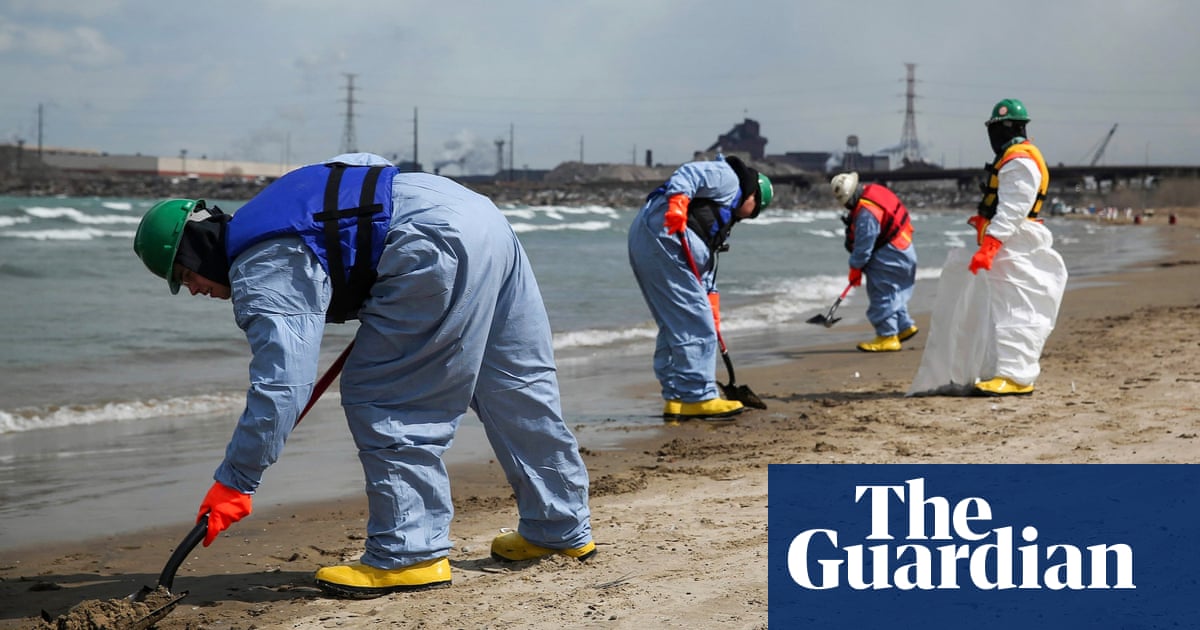The US justice department on Wednesday filed lawsuits againstHawaiiandMichiganover their planned legal action againstfossil fuel companiesfor harms caused by theclimate crisis, claiming the state actions conflict with federal government authority andDonald Trump’s energy dominance agenda.
The suits, which legal experts say are unprecedented, mark the latest of theTrump administration’s attacks on environmental work and raise concern over states’ abilities to retain the power to take climate action without federal opposition.
In court filings, the justice department said the Clean Air Act – a federal law authorizing the Environmental Protection Agency (EPA) to regulate air emissions – “creates a comprehensive program for regulating air pollution in the United States and ‘displaces’ the ability of states to regulate greenhouse gas emissions beyond their borders”.
The justice department argues that Hawaii andMichiganare violating the intent of the act that enables the EPA authority to set nationwide standards for greenhouse gases, citing the states’ pending litigation against oil and gas companies for alleged climate damage.
Michigan’s attorney general, Dana Nessel, a Democrat, last year tapped private law firms to go after the fossil fuel industry for negatively affecting the state’s climate and environment.
Meanwhile, Hawaii’s governor, Josh Green, another Democrat, plans to target fossil fuel companies that he said should take responsibility for their role in the state’s climate consequences, including 2023’s deadly Lahaina wildfire.
When burned, fossil fuels release emissions such as carbon dioxide that warm the planet.
Both states’ laws “impermissibly regulate out-of-state greenhouse gas emissions and obstruct the Clean Air Act’s comprehensive federal-state framework and EPA’s regulatory discretion”, the justice department’s court filings said.
The justice department also repeated the Republican president’s claims of a US energy emergency and crisis. “At a time when states should be contributing to a national effort to secure reliable sources of domestic energy”, Hawaii and Michigan are “choosing to stand in the way”, the filings said.
A spokesperson for the office of the Democratic Michigan governor, Gretchen Whitmer, deferred to Nessel when asked for comment.
“This lawsuit is at best frivolous and arguably sanctionable,” Nessel said in a statement, which noted that Michigan had not filed a lawsuit. “If the White House or big oil wish to challenge our claims, they can do so when our lawsuit is filed; they will not succeed in any attempt to pre-emptively bar our access to make our claims in the courts. I remain undeterred in my intention to file this lawsuit the president and his big oil donors so fear.”
Green’s office and the Hawaii attorney general’s office did not immediately respond to requests for comment.
But legal experts raised concern over the government’s arguments.
Michael Gerrard, founder and faculty director of the Columbia University Sabin Center for Climate Change Law, said usual procedure was for the justice department to ask for a court to intervene in pending environmental litigation – as is the case in some instances across the country.
While this week’s suits are consistent with Trump’s plans to oppose state actions that interfere with energy dominance, “it’s highly unusual”, Gerrard told the Associated Press. “What we expected is they would intervene in the pending lawsuits, not to try to pre-empt or prevent a lawsuit from being filed. It’s an aggressive move in support of the fossil fuel industry.
“It raises all kinds of eyebrows,” he added. “It’s an intimidation tactic, and it’s telling the fossil fuel companies how much Trump loves them.”
Ann Carlson, an environmental law professor at the University of California, Los Angeles, who has previously consulted on climate litigation, said this week’s lawsuits look “like DoJ grasping at straws”, noting that the EPA administrator, Lee Zeldin, said his agency was seeking to overturn a finding under the Clean Air Act that greenhouse gases endanger public health and welfare.
“So on the one hand the US is saying Michigan, and other states, can’t regulate greenhouse gases because the Clean Air Act does so and therefore pre-empts states from regulating,” Carlson said. “On the other hand the US is trying to say that the Clean Air Act should not be used to regulate. The hypocrisy is pretty stunning.”
TheTrump administrationhas aggressively targeted climate policy in the name of fossil fuel investment. Federal agencies have announced plans to bolster coal power, roll back landmark water and air regulations, block renewable energy sources, and double down on oil and gas expansion.
